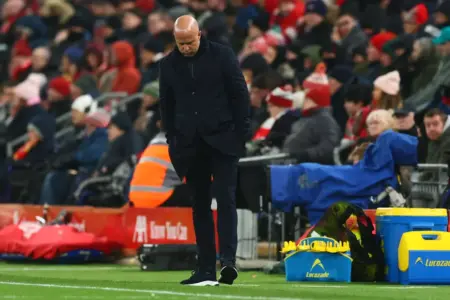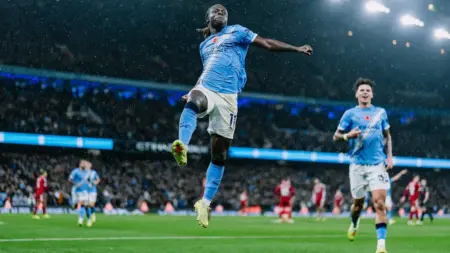The Changing Dynamics of Premier League Substitutions
As the demands of a packed football calendar weigh heavily on Premier League managers, the strategic use of substitutions has become an essential tool to manage player workloads, address injuries, and gain a competitive edge. Since the pandemic, the introduction of up to five substitutes over three occasions has further emphasized the importance of tactical acumen. BBC Sport has analyzed the data to uncover which teams are making the most of their bench and the impact these changes have on their performance.
Most and Least Frequent Users of Substitutions
Brighton’s Fabian Hurzeler leads the pack with the highest number of substitutions, averaging 4.8 per game. This trend is a continuation from his predecessor, Roberto de Zerbi, who made 4.6 changes per match. Brighton’s strategy is driven by the need to avoid injuries while navigating a busy domestic and European schedule. The club’s significant summer spending has bolstered their bench, allowing Hurzeler to introduce fresh legs and different tactics late in games. For instance, he often brings on attacking wingers to press full-backs who might be tiring.
Interestingly, two relegated clubs, Southampton and Ipswich Town, also feature prominently in the list of top substitution-makers. Both teams have frequently found themselves trailing in matches, necessitating early changes to turn the tide. However, at the other end of the spectrum, Manchester City’s Pep Guardolia remains one of the least frequent users of substitutions. Despite facing more challenges this season, Guardiola averages only 3.3 changes per game, a reflection of his confidence in his starting lineup and tactical approach. Similarly, Enzo Maresca at Chelsea has been reluctant to make many changes, sticking to his preferred team even during recent poor form.
Tactical Flexibility and Sticking to the Plan
The reluctance of managers like Guardiola and Maresca to make frequent substitutions highlights their commitment to a consistent tactical approach. Guardiola, known for building formidable teams, rarely deviates from his winning formula, even when the team faces difficulties. Similarly, Maresca, despite Chelsea’s large squad, has stuck to his core group, focusing on building a cohesive unit. This approach contrasts sharply with the proactive strategies employed by managers like Hurzeler, who are more willing to adapt and introduce new elements as the game progresses.
Everton, with the fewest substitutions, faces a different set of challenges. Their limited bench depth and the pragmatic approach of former manager Sean Dyche have led to a conservative use of subs, often aimed at securing a point rather than chasing a win. This strategy, while effective in maintaining a solid defensive structure, has limited their ability to impact games positively.
Goal Contributions from the Bench
The effectiveness of substitutions is most evident in the goal contributions from the bench. Brighton, Fulham, and Bournemouth are the most active in this regard, with each team reaping significant rewards. Bournemouth, in particular, has seen four different players score two goals each off the bench, showcasing the depth and versatility of their squad. Andoni Iraola has effectively used his substitutes to maintain the team’s high-energy pressing style, ensuring they remain competitive even in the latter stages of matches.
At Fulham, Marco Silva’s substitutes have netted 11 goals, with Rodrigo Muniz and Harry Wilson making notable contributions. These late-game goals have often been crucial in securing points, highlighting the impact of tactical flexibility. Arsenal, despite featuring in the top four for goal involvements by substitutes, has not had a center-forward score from the bench, possibly indicating a gap in their attacking options.
Contrasting Fortunes in Goal Contributions
While some teams have found success through their substitutions, others have struggled. Former Leicester City manager Steve Cooper boasts the best subs-to-goal ratio, with 16% of the team’s goals coming from subs. This efficiency is a testament to his tactical acumen and the depth of the Leicester squad. Conversely, Manchester United, under Ruben Amorim, have seen only one goal involvement from a substitution, a stark contrast to their previous form. This suggests a potential lack of depth and flexibility in their squad.
Southampton, despite being one of the most active in making substitutions, has produced only one goal from the bench since Ivan Juric’s arrival. This trend is mirrored by Newcastle United and Crystal Palace, both of which have scored just a few more goals through substitutes. This indicates a reliance on their first-choice players and a possible lack of depth in their squads.
The Impact of Substitutions on Team Performance
The analysis of substitution patterns and their impact reveals a nuanced picture of Premier League dynamics. Teams that are proactive in making changes, like Brighton and Bournemouth, have been able to use their bench to maintain intensity and find crucial goals. This approach has often paid dividends, particularly in tight matches where fresh legs and new ideas can make a significant difference.
On the other hand, teams that stick to a more consistent lineup, like Manchester City and Chelsea, have found success through their core group. However, the lack of flexibility can sometimes limit their ability to adapt to in-game challenges. As the competition in the Premier League grows fiercer, the strategic use of substitutions will continue to be a key factor in determining success.











